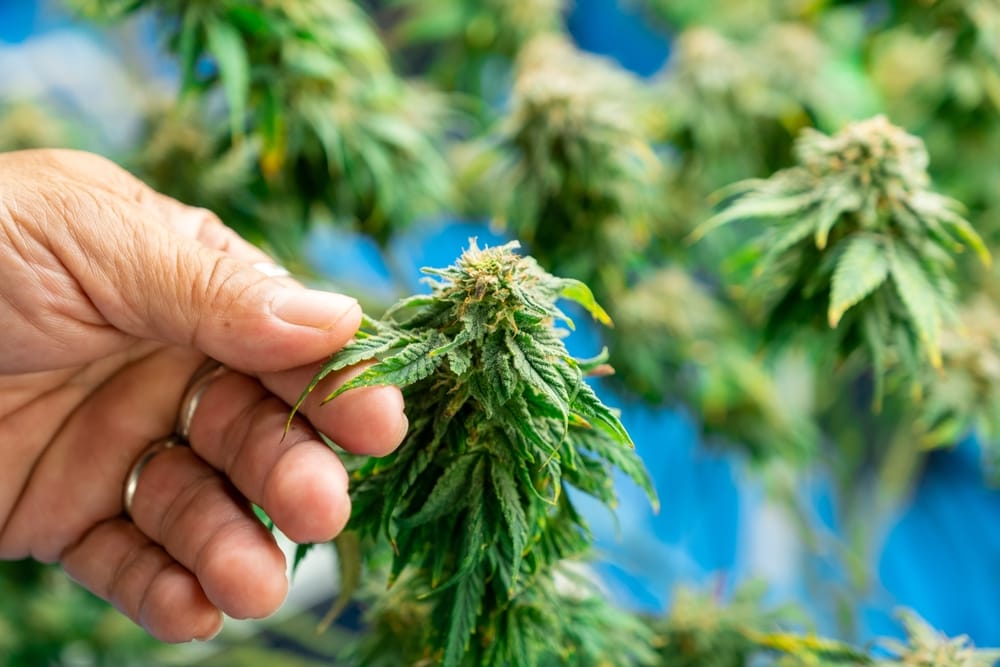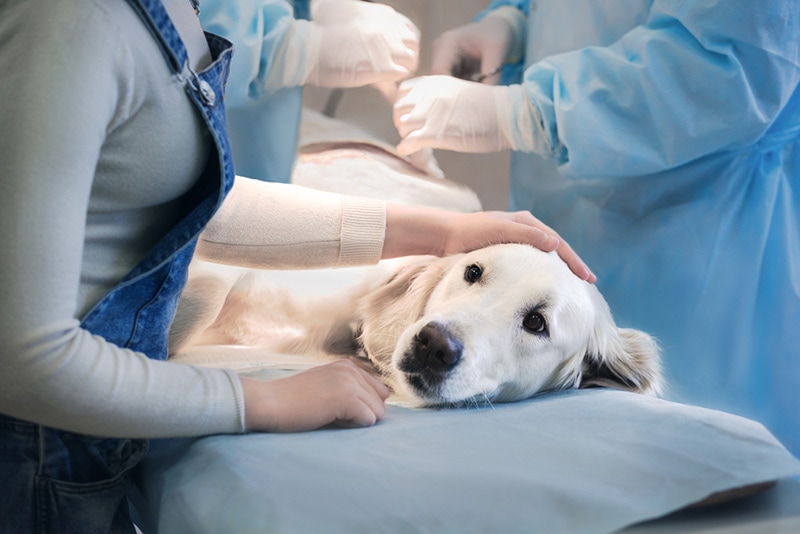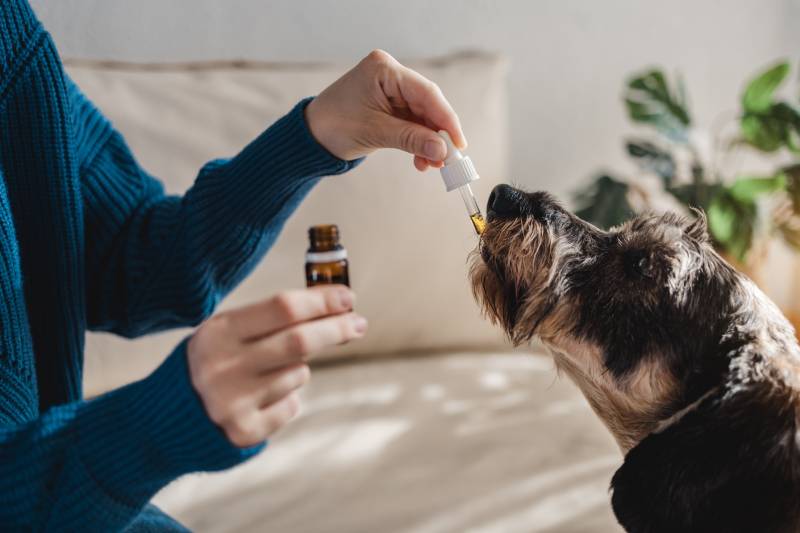
Click to Skip Ahead
Sometimes accidents happen. If your dog has consumed weed, contact your veterinarian as soon as possible. Do not panic. Determine what type of weed they consumed (buds, leaves, brownies, edibles, etc.). You must also monitor your dog for possible signs of marijuana intoxication.
Fatal cases are rare, except for those in which the dog has consumed large amounts of marijuana or if the weed they ate contained chocolate or xylitol (artificial sweetener).
Read on to learn what to do if your dog has accidentally consumed weed and/or weed products, the clinical signs of weed intoxication, how to prevent it from happening again, how toxic weed is to dogs, and the benefits of cannabidiol (CBD) for dogs.
What to Do If Your Dog Ate Weed
If your dog has accidentally consumed marijuana, it is important not to panic. Although you need to contact the vet (and the sooner, the better), there are a few steps that you can take to care for your dog until you get to the vet.
1. Determine the Type of Weed
First, you need to determine what kind of weed your dog consumed: leaves or buds. This information will be useful to the veterinarian. The leaves have a lower content of tetrahydrocannabinol 1 (THC, the psychoactive component of weed, which is toxic to pets) compared to the buds (inflorescences). The THC content decreases with each part of the plant (from top to bottom), as follows:
Therefore, weed buds are more dangerous for your dog than the leaves.
It should be noted that cannabidiol (CBD) is not the same as THC. CBD is veterinary approved for pet consumption. The compound cannabidiol is not psychoactive.
You also have to consider other ingredients. For example, if your dog has eaten weed brownies (which contain chocolate), it is possible that your pet will get chocolate poisoning. Chocolate is more dangerous than weed (especially THC), and as a result, you must take your dog to the vet immediately.
Weed gummies and THC edible candies or mints may contain xylitol, another substance that is toxic to dogs. If this is your dog’s case, you have to take them to the vet immediately.
Both chocolate and xylitol poisoning can be fatal to dogs.

2. Monitor Them for Clinical Signs of Weed Intoxication
A crucial thing to do is monitor your dog for possible signs of intoxication. Although weed intoxication in pets is rarely fatal (if they do not consume brownies or products with xylitol), it can be severe. The most common signs of weed intoxication in dogs may include:
If you notice any of these clinical signs after your dog has consumed weed (especially if they have an irregular heart rate or are vomiting severely), contact your veterinarian immediately.
3. Contact the Vet
It can be embarrassing to tell the vet about what just happened. However, the more details the veterinarian has about your dog’s condition, the faster they can diagnose your pet properly. The veterinarian’s role is not to judge you but to save your pet.
Even if your dog does not show signs of severe intoxication, the veterinarian will need to evaluate their vital functions. Also, if it hasn’t been long since your dog consumed weed, the vet can try to induce vomiting.
If your dog suffers from moderate to severe clinical signs, the veterinarian may recommend hospitalizing them so they can be treated and monitored. Treatment can consist of administering intravenous fluids, activated charcoal (to bind the toxins), anti-nausea medication, and warming devices if your dog has a low temperature.
Ingestion of marijuana is not usually fatal in dogs. Only if your dog has consumed weed brownies, weed products that also contain xylitol, or a large amount of marijuana is there a risk of death.

How to Prevent Accidental Weed Ingestion in Dogs
You can prevent your dog from accidentally consuming weed by properly storing your weed products. Smoking in another room and safe storage of edibles and weed products will minimize access.
Don’t feed weed leaves or buds to your dog, and don’t intentionally blow the smoke in their face. This is categorized as abusive behavior because your dog can’t give their consent to experience the “fun part of being high.” Dogs do not enjoy the experience; they get confused and anxious because they don’t know what is happening to them. The harmful substances also remain in their bodies even after the effect has worn off.
Also, if you’re growing weed indoors, secure the room to keep pets out of that space and to prevent them from getting to the leaves and buds. If you grow weed outdoors, you can secure your garden in several ways, such as enclosing it with a fence.
How Toxic Is Weed to Dogs?
Weed is equally toxic to both humans and animals, but pets reach toxic levels faster than humans because they have smaller bodies.
The minimum lethal oral dose for dogs is more than 3 g THC/kg body weight. So, your dog has to consume huge amounts of weed to get severely intoxicated and die. The effects of weed in dogs can be seen in approximately 60 minutes from the moment of ingestion.

What Is Cannabidiol and What Are Its Benefits for Dogs?
CBD is not the same thing as THC. It is not psychotropic and has no known harmful side effects for pets. It is a powerful natural compound found in cannabis and hemp plants. The hemp plant contains much higher amounts of CBD.
CBD comes in a variety of forms, such as oils, topical products, and snacks. However, oils are the most popular. If you want to give CBD oil to your dog, talk to your veterinarian first.
Choose the oil according to the concentration of CBD in the oil and to your dog’s weight and health problems. You should also carefully read the ingredient list to make sure no ingredient could be harmful to your dog. Avoid CBD oils that also have low concentrations of THC because these can be dangerous.
Conclusion
If your dog has accidentally ingested weed, don’t panic. Determine what kind of weed they consumed (leaves, buds, or products that contain other ingredients that can be harmful to dogs), monitor them for possible clinical signs of intoxication, and call the veterinarian. Although it can be embarrassing to tell the vet what happened, they need to have this information so they can treat your dog properly.
Common clinical signs of weed intoxication in dogs include incoordination, urination in unauthorized places, depression, dilated pupils, low or high temperature, and irregular heart rate. In severe cases, convulsions can also occur. While rare, death is possible if your dog consumes products containing weed and chocolate or xylitol, these two latter ingredients being toxic for pets. Keep your weed products out of your pet’s reach, do not give them weed to eat, and do not blow the smoke in their face.
See also:
- Is Vaping Around Dogs Bad? Vet Approved Advice
- Can Dogs Get High? Vet-Approved Marijuana Toxicity Facts & FAQ
Featured Image Credit: Michael Fischer, Shutterstock








